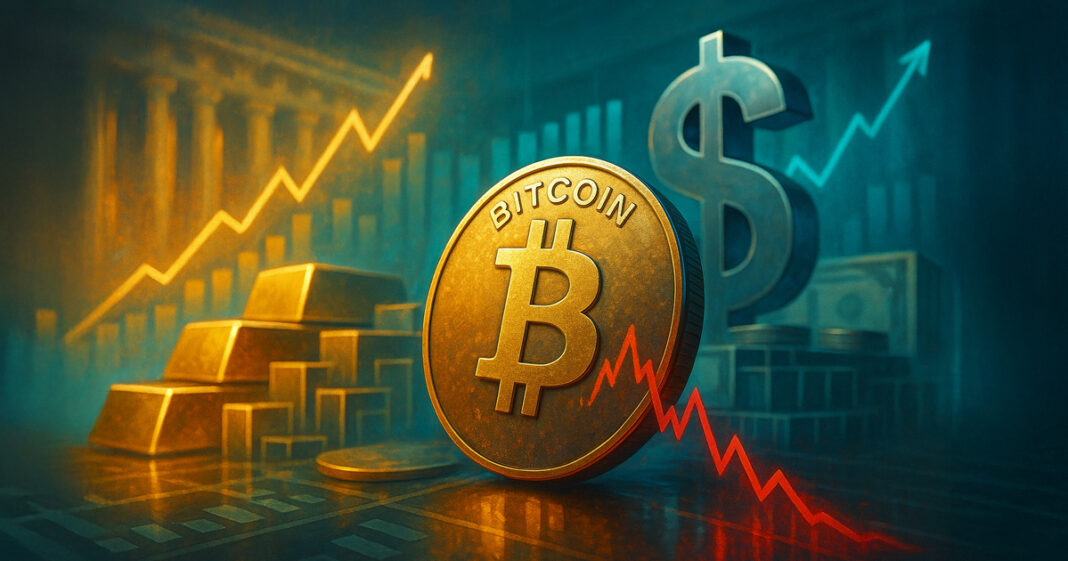Market Pulse
The cryptocurrency market, often lauded for its decentralization and independence from traditional finance, found itself reeling this week from a powerful external shock. A sudden and dramatic announcement from former President Donald Trump regarding escalating tariffs on Chinese imports sent a seismic wave across global markets, with Bitcoin and Ethereum bearing the brunt of the immediate fallout. The swift price corrections underscore the growing interconnectedness between the crypto sphere and macroeconomic geopolitical developments, challenging narratives of digital assets as insulated safe havens.
Geopolitical Jolt: Trump’s Tariff Announcement
In a move that caught many by surprise on October 10, 2025, former President Donald Trump declared a sweeping 100% tariff on a broad range of Chinese imports. This aggressive stance, aimed at rebalancing trade relations and bolstering domestic industries, immediately triggered anxieties across financial sectors worldwide. Analysts quickly began to digest the potential implications for global supply chains, inflation, and economic growth, leading to a palpable sense of unease that cascaded from traditional stock markets into the digital asset space.
Historically, such protectionist measures can inject significant uncertainty, prompting investors to de-risk and seek safety. While some purists argue for Bitcoin’s role as a hedge against fiat debasement, the immediate reaction proved otherwise, indicating that in times of acute market stress, liquidity and short-term capital preservation often take precedence, even in crypto markets.
Bitcoin and Ethereum Bear the Brunt of Sell-Off
The impact on major cryptocurrencies was swift and severe. Bitcoin, the flagship digital asset, experienced a sharp plunge, with prices quickly descending towards the $112,500 level. Ethereum, the second-largest cryptocurrency by market capitalization, also suffered substantial losses, reflecting a broad-based market downturn. Noted crypto critic Peter Schiff wasted no time in amplifying bearish sentiment, specifically warning that Ethereum “looks worse” and could fall to as low as $1,500, leveraging the market’s vulnerability following the tariff news.
- Bitcoin (BTC) Price Drop: Fell significantly, testing support levels around $112,500, marking a brutal correction.
- Ethereum (ETH) Decline: Also experienced a substantial correction, facing renewed bearish outlooks amplified by prominent critics.
- Wider Market Contagion: The sell-off wasn’t limited to BTC and ETH, affecting numerous altcoins as fear permeated investor sentiment across the digital asset ecosystem.
This rapid depreciation highlights how quickly market sentiment can pivot in response to major geopolitical shifts, underscoring the still-speculative nature of digital assets in the eyes of many institutional and retail investors.
The Anticipatory Trader: A $160 Million Short
Amidst the widespread losses, one particular story emerged, exemplifying the high-stakes world of crypto trading. Reports surfaced of a sophisticated trader who successfully executed a massive short position on Bitcoin just before the crash, netting an estimated $160 million by accurately predicting the market’s adverse reaction to Trump’s tariff announcement. This individual’s foresight allowed them to capitalize on the downward trend, securing a monumental profit while the broader market bled.
The incident serves as a stark reminder of the sophisticated analytics and risk management employed by some market participants, capable of extracting immense value even from sudden, unpredictable events. It also ignites debate about market efficiency and the availability of information, given the swiftness of the tariff’s impact.
Market Volatility and Investor Response
The episode reinforces the notion that the cryptocurrency market, despite its unique characteristics, remains susceptible to external macroeconomic and geopolitical forces. As crypto gains mainstream acceptance, its correlation with traditional markets appears to be strengthening, meaning global policy decisions and international trade disputes can have direct, tangible effects on digital asset valuations.
For investors, such events present both risks and potential opportunities. While the immediate pain of significant price drops is evident, long-term holders might view these corrections as chances to accumulate assets at a discount. However, the increased volatility demands heightened vigilance and a robust understanding of both on-chain metrics and global economic indicators.
Conclusion
The dramatic market downturn triggered by former President Trump’s tariff announcement against China serves as a potent reminder of the complex interplay between geopolitics, traditional finance, and the cryptocurrency ecosystem. Bitcoin and Ethereum’s sharp declines, coupled with the success of anticipatory traders, underscore that digital assets are no longer immune to global economic tremors. As the crypto market matures, its integration into the wider financial landscape means investors must increasingly monitor not just blockchain developments, but also the broader geopolitical currents that can dictate market sentiment and price action.
Pros (Bullish Points)
- Demonstrates crypto's responsiveness to global macro events, potentially attracting sophisticated traders.
- Opportunity for long-term investors to accumulate assets at lower prices during a major market correction.
Cons (Bearish Points)
- Highlights crypto's vulnerability to traditional geopolitical shocks, challenging its 'safe haven' narrative.
- Increased volatility may deter new institutional investors seeking stability and predictable market conditions.
Frequently Asked Questions
What caused the recent crypto market crash?
The crash was primarily triggered by former President Trump's announcement on October 10, 2025, of a 100% tariff on Chinese imports, creating widespread market uncertainty.
How did Bitcoin and Ethereum react to the tariff news?
Bitcoin's price plunged to levels around $112,500, while Ethereum also saw significant declines and drew renewed bearish sentiment from critics like Peter Schiff.
What are the implications of geopolitical events on crypto markets?
Geopolitical announcements can act as major catalysts, creating significant volatility and demonstrating crypto's increasing interconnectedness with global economic and political policies.



